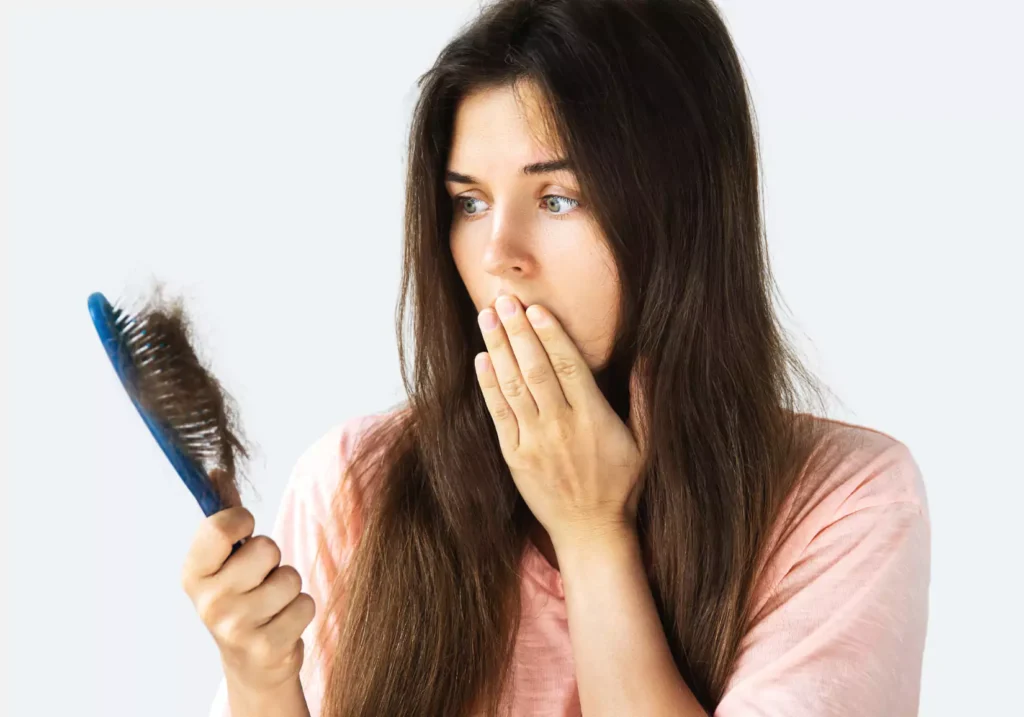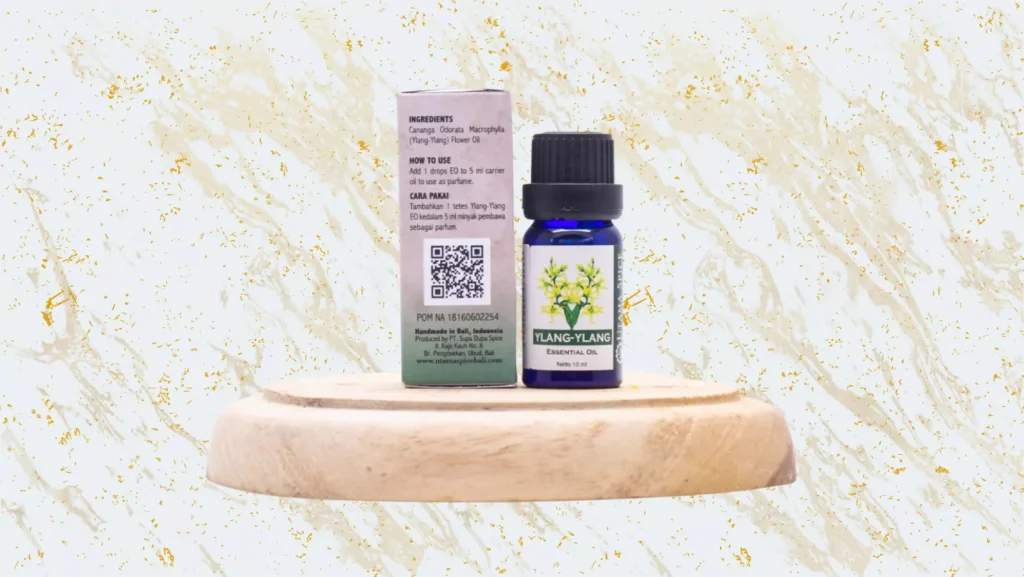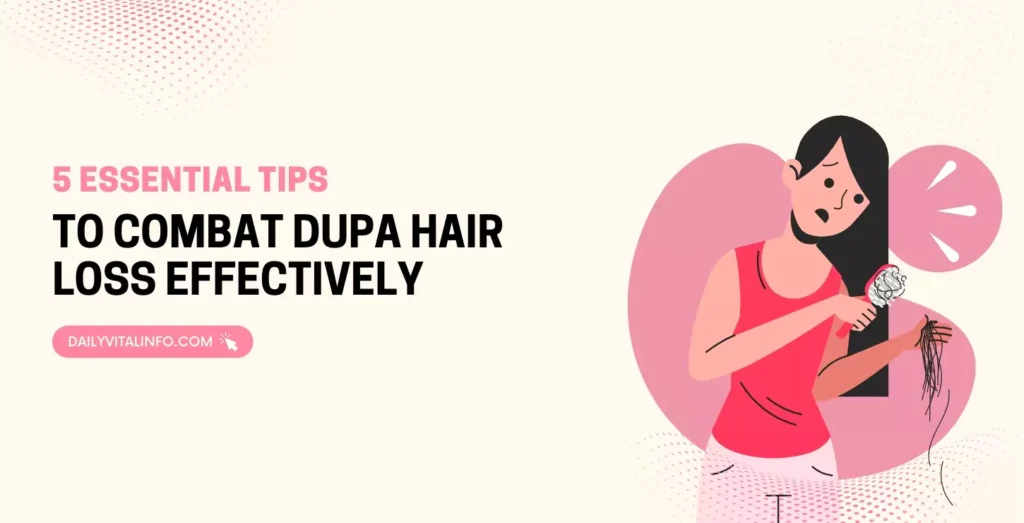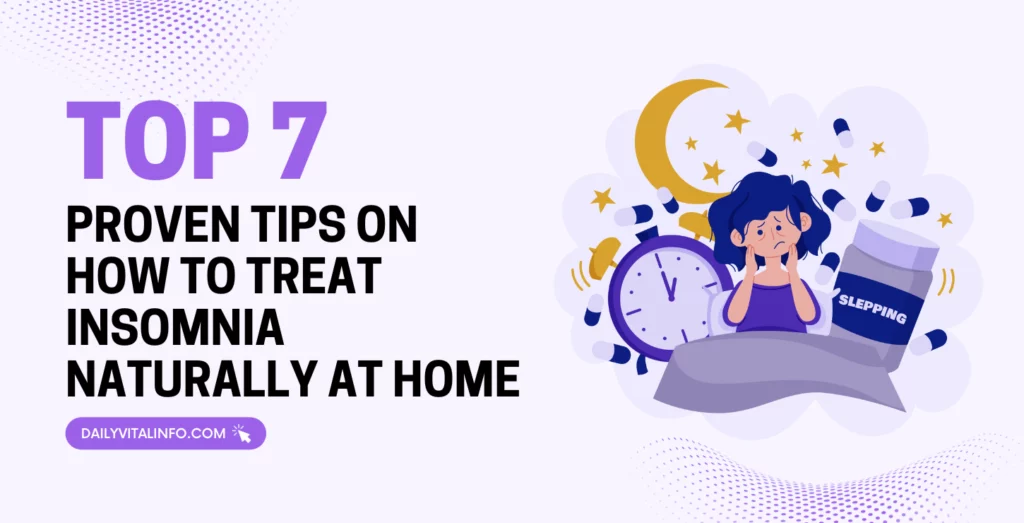Diffuse Unpatterned Alopecia (DUPA) is a type of hair loss characterized by general thinning without a specific pattern. It’s a subtype of androgenetic alopecia and affects both the front, top, and sides of the scalp.
Understanding DUPA and its implications is essential for anyone experiencing widespread hair loss. DUPA can be particularly challenging as it presents similarly to other forms of hair loss, but with its distinct lack of pattern, it requires a different approach to diagnosis and treatment.
This condition not only affects one’s appearance but can also lead to psychological stress. Early detection and seeking professional advice are crucial in managing DUPA effectively. Treatments such as minoxidil and finasteride are often recommended to slow down hair loss and potentially stimulate hair growth. While a hair transplant may not be advisable for DUPA patients, medical treatments can often provide some relief and help manage the condition.

Understanding Dupa Hair Loss
Dupa Hair Loss, medically termed Diffuse Unpatterned Alopecia, signifies a non-patterned hair thinning on the scalp. Unlike traditional baldness, DUPA affects both men and women, leading to widespread hair loss without a specific pattern.
What Is Dupa Hair Loss?
Addressing one of the lesser-known conditions within the hair loss community, Dupa stands for Diffuse Unpatterned Alopecia. This type of hair thinning is characterized by a widespread decrease in density over the scalp without the distinctive patterns seen in other kinds of alopecia. Dupa can be both confusing and distressing for sufferers, as it can occur seemingly without warning and is less predictable than patterned hair loss.
Identifying Dupa Hair Loss
Identifying this condition correctly is the first stride in managing it:
- Uniform Thinning: Unlike pattern baldness that affects specific areas, hair diffusely thins throughout the scalp.
- No Predictable Pattern: There’s an absence of the receding hairline or bald spots that typically signify male or female pattern baldness.
- Rate of Loss: The speed at which hair sheds can vary, but often, individuals notice a gradual change rather than sudden baldness.
Causes Of Dupa Hair Loss
A plain paragraph discussing the complexity of Dupa’s causative factors would provide insight into how multifaceted this condition is. There are a myriad of potential causes for Dupa hair loss, ranging from genetic predispositions to lifestyle and environmental factors. Unlike patterned hair loss, which can often be directly attributed to genetics, Dupa may arise from a complex interplay of several issues, making pinpointing the exact cause a challenging pursuit for experts and patients alike.
Managing Dupa Hair Loss
Managing this condition often requires a multifaceted approach:
- Medical Treatments: Products like minoxidil or finasteride may slow the progression by promoting hair growth and decreasing shedding.
- Lifestyle Changes: Adjusting diet, managing stress, and ensuring adequate nutrition and sleep can play a role in overall hair health.
- Professional Assistance: Consulting healthcare providers specializing in hair loss is key to getting personalized advice and treatment plans.
The Impact Of Dupa Hair Loss On Quality Of Life
It’s vital to talk about the profound effect hair loss can have beyond the physical symptoms. Dupa hair loss not only affects one’s appearance but can also deeply impact an individual’s self-esteem and emotional well-being. While the extent of its impact can vary from person to person, many report feelings of frustration and a decreased sense of identity, which underscores the importance of seeking both medical and psychological support when dealing with this condition.
Tip 1: Proper Nutrition And Diet
Proper nutrition and diet play a crucial role in combating Dupa Hair Loss. Ensuring adequate vitamin and mineral intake can help maintain healthy hair growth and overall scalp health.
Thinning hair can be a distressing experience, impacting not just your appearance but also your self-esteem. Before you consider investing in expensive treatments or products, it’s fundamental to revisit the core aspect of hair health – your nutrition. After all, the building blocks for strong hair come from within.
Let’s dive into how a balanced diet can be the first step towards reclaiming your luscious locks.
The Impact Of Essential Nutrients On Hair Growth
Your hair is primarily made of protein, which underscores the significance of having enough protein in your diet. Hair follicles are alive and need the right mix of nutrients to flourish:
- Protein: Hair is composed mainly of a protein called keratin. A lack of protein in the diet can lead to weak, brittle hair or a slowing of the growth cycle.
- Vitamins: Certain vitamins, including A, C, D, and E, play a crucial role in hair health by supporting the scalp and hair growth. For instance, Vitamin E acts as an antioxidant that helps prevent oxidative stress that can lead to hair loss.
- Minerals: Iron and zinc deficiencies are some of the top culprits behind hair shedding. These minerals aid in hair growth and repair cycles.
Foods That Promote Healthy Hair
To ensure your body has what it needs to grow healthy hair, incorporate a diverse range of foods into your diet. Here’s a list of key food categories and how each contributes to hair health:
- Lean Meats and Fish: These are excellent sources of protein and omega-3 fatty acids, which can improve hair density and decrease the risk of hair thinning.
- Leafy Greens: Spinach and kale pack a punch with vitamins A and C, necessary for sebum production, which works as a natural hair conditioner.
- Nuts and Seeds: Loaded with vitamin E and essential fatty acids, especially almonds and flaxseeds, they can foster a healthy scalp and hair.
Remember, even the best diets can take time to show results in your hair, so patience and consistency are key. Instead of expecting overnight miracles, take this as an opportunity to develop healthier eating habits that will benefit not only your hair but your overall well-being, too.
Tip 2: Effective Hair Care Routine
Establishing a robust hair care routine is vital for managing DUPA hair loss. Using targeted treatments like minoxidil can stimulate follicle growth and slow thinning. Regular scalp massages can also enhance blood flow, supporting healthier hair.
Establish A Gentle Cleansing Regimen
To maintain a healthy scalp and combat hair loss, a delicate approach to cleansing is essential. Harsh shampoos and excessive washing can strip your scalp of its natural oils, leading to dryness and brittle strands. Instead, opt for gentle, sulfate-free shampoos that clean without removing the scalp’s protective lipids.
Limit washes to two to three times a week, allowing your hair to retain moisture and rebuild its natural strength.
Nourish Your Scalp And Hair
Nourishing your hair starts right at the roots – the scalp. Here’s how to provide the best for your hair:
- Balanced diet: Ensure your meals are rich in omega-3 fatty acids, proteins, and antioxidants. These nutrients fortify hair follicles and spark regrowth.
- Hydrating treatments: Integrate deep conditioning sessions into your regimen to restore hydration and elasticity to your hair.
- Scalp massages: Regular massages with essential oils such as rosemary and peppermint can stimulate blood flow, encouraging growth and vitality.
Trim Regularly For Hair Health
Split ends are not just a cosmetic annoyance; they can lead to further damage if left unattended. Trimming your hair every 6-8 weeks is a proactive step in preventing the splitting from traveling up the hair shaft. Keeping your hair trimmed ensures that it remains strong, healthy, and free from breakage that can exacerbate hair thinning.
Embrace Low-heat Styling
Styling your hair is part and parcel of looking good, but too much heat can be detrimental:
- Let hair air-dry: Whenever possible, choose to air-dry over blow-drying to minimize heat exposure and retain your hair’s natural texture.
- Protect before you heat: If you must use heated tools, always apply a heat-protectant spray to create a barrier between the heat and your hair strands.
- Opt for cooler settings: Using straighteners and curling irons at lower temperatures can still achieve stylish results without excessive damage.
Avoid Tight Hairstyles
Pulling your hair into tight ponytails, buns, or braids can cause tension that leads to hair breakage and loss over time. Instead, go for looser styles that don’t put unnecessary strain on your follicles, and remember to change up your hairstyle often to prevent stress on any one area of your scalp.
By incorporating these hair care tips into your routine, you’ll set a strong foundation to combat hair loss and promote healthier, fuller hair. Remember, consistency is key, and your locks will thank you for the tender, loving care.
Tip 3: Stress Management Techniques
Managing stress is pivotal for individuals with Dupa hair loss, as high stress levels can exacerbate the condition. Engaging in regular relaxation practices like meditation, deep breathing exercises, or yoga can help mitigate stress-related hair thinning.
Hair loss can be a complex issue with a myriad of potential contributors, but one aspect often overlooked is the impact of stress on your mane. Mastering stress management techniques is not only beneficial for your overall well-being but is also crucial in the battle against hair thinning and loss.
Keeping stress levels in check might indeed help preserve those precious locks.
Breathing Exercises
Mindfulness and deep breathing exercises are a simple yet powerful way to lower stress levels. This can promote a better environment for hair growth. Here are a few techniques to try:
- Diaphragmatic Breathing: Inhale deeply through the nose, allowing your diaphragm (not your chest) to expand; then slowly exhale through the mouth. This exercise encourages full oxygen exchange and can help calm the nervous system.
- 4-7-8 Technique: Inhale for 4 seconds, hold for 7 seconds, and exhale for 8 seconds. This method is believed to promote relaxation and improve sleep, which is beneficial for hair health.
Regular Physical Activity
Getting regular exercise isn’t just great for your body; it’s also fantastic for reducing stress levels. A consistent workout regimen can boost endorphins and combat the stress hormones that contribute to hair loss.
- Choose an activity you enjoy: Whether it’s running, swimming, cycling, or even dancing, participating in physical activities you love can make exercise an enjoyable stress reliever.
- Aim for at least 30 minutes a day: The American Heart Association recommends 150 minutes of moderate-intensity aerobic activity each week, which can be broken down into 30-minute sessions over five days.
Mindfulness Meditation
Mindfulness meditation is an effective technique to find your zen and minimize stress. It encourages present-moment awareness and can be practiced anywhere, at any time.
- Utilize guided meditation apps: Many apps are available that provide structured meditation sessions for all levels. They can be especially helpful for beginners.
- Set aside a regular time each day: Consistency is key. Even five minutes daily can make a significant difference in reducing stress and its impact on your hair health.
Yoga For Stress Relief
Combining physical postures, breath control, and meditation, yoga is a holistic approach to stress management. It not only strengthens the body but also helps clear the mind.
- Try different yoga styles: From gentle Hatha to more vigorous Vinyasa, explore various types of yoga to find what best suits your stress-relief needs.
- Attend classes or practice at home: With countless online resources available, you can join a class or practice yoga in the comfort of your own home.
Tip 4: Medical Treatments And Supplements
Explore medical treatments and supplements to combat DUPA hair loss, such as minoxidil or low-level laser therapy. Proper interventions may stimulate follicular activity and slow thinning for those affected by diffuse unpatterned alopecia.
Exploring the myriad of strategies to combat hair loss, one can’t overlook the significance of medical treatments and supplements. This approach encapsulates a range of options, from prescription medications to over-the-counter remedies, all aimed at revitalizing your hair’s health.
Prescription Medications
A cornerstone in the fight against diffuse unpatterned alopecia (DUPA) includes prescription medications. Here’s a rundown of notable mentions:
- Minoxidil (Rogaine): This topical treatment enhances blood flow to hair follicles, potentially awakening dormant hairs and fostering regrowth.
- Finasteride (Propecia): An oral medication that impedes the body’s ability to produce DHT, the hormone responsible for hair follicle shrinkage in men.
Vitamin And Mineral Supplements
Balancing your diet with the right supplements is crucial for hair vitality:
- Vitamin D: Known to kickstart the hair production process and may awaken dormant follicles.
- Iron: Deficiency in iron is linked to hair loss, making supplementation essential for some individuals.
- Zinc: This mineral plays a vital role in hair tissue growth and repair.
Low-level Laser Therapy (LLLT)
Low-Level Laser Therapy employs clinically studied wavelengths of light to stimulate and energize cellular activity within the hair follicles:
- It’s a non-invasive treatment that can be used at home or in clinics.
- Some studies show an increase in hair density for patients using LLLT devices.
Platelet-rich Plasma (PRP) Injections
Platelet-rich plasma (PRP) injections harness your body’s healing mechanisms:
- A concentration of platelets from your own blood is injected into the scalp.
- PRP injections aim to stimulate hair growth by promoting increased blood supply and nutrients to hair follicles.
Over-the-counter Supplements
Augmenting your diet with over-the-counter supplements can also support hair health:
- Biotin: Often touted for its ability to strengthen hair and nails.
- Omega-3 fatty acids: These supplements might reduce inflammation and lead to a healthier scalp.
Managing Blockers And Boosters
Understanding what to avoid and what to incorporate is vital:
- Avoid supplements with excessive Vitamin A, which could exacerbate hair loss.
- Incorporate a balanced diet rich in proteins, as they are the building blocks of hair.
Arming yourself with the correct knowledge about medical treatments and supplements is pivotal in the management of DUPA. With these tips in mind, formulating an effective approach becomes a tangible possibility.
5 Essential Steps: Instant Relief for Unbearable Sinus Tooth Pain
Tip 5: Lifestyle Changes
Combatting DUPA hair loss can benefit significantly from a tailored lifestyle adjustment. Prioritizing stress reduction and a nutrient-rich diet encourages healthier hair growth while also integrating regular exercise that boosts overall well-being.
Tackling hair loss can be a daunting journey, with numerous factors to consider and a myriad of potential solutions at hand. Yet, amidst this complex situation, lifestyle changes stand out as a powerful, yet often overlooked, weapon in the fight against hair loss.
Let’s peel back the layers of this solution and uncover how simple daily adjustments can make a significant impact.
Regular Exercise:
Incorporating regular physical activity into your daily routine can work wonders for your overall health and the condition of your hair. Here’s why hitting the gym or taking that jog is not just about keeping fit:
- Improved Blood Circulation: Engaging in regular exercise enhances blood flow to the scalp, nourishing hair follicles and promoting healthier hair growth.
- Stress Reduction: Exercise releases endorphins, which help manage stress levels and are a known contributor to hair loss.
Balanced Diet:
You truly are what you eat, and your hair is no exception. Feeding your body with the right nutrients can lead to lustrous locks:
- Proper Nutrition: A diet rich in vitamins and minerals strengthens hair follicles. Look for foods high in iron, Vitamin E, and Omega-3 fatty acids.
- Hydration: Drinking plenty of water each day aids in hydrating the scalp and hair strands, reducing dryness and breakage.
Sleep Optimization:
The value of a good night’s rest extends beyond mere relaxation. Discover the connection between your pillow and your hair:
- Hair Growth Cycle: Sufficient sleep is crucial as it allows the body to repair and regenerate hair follicles during the night.
- Cortisol Levels: Proper rest helps to keep cortisol, the stress hormone that can influence hair loss, at bay.
Stress Management:
Stress, the silent enemy of many health-related conditions, can also be a culprit in hair loss scenarios. Let’s explore stress management techniques:
- Mindfulness and Meditation: Adopting practices like meditation can help soothe the mind, reducing the physiological impacts of stress on hair growth.
- Hobbies and Activities: Engaging in activities you enjoy can serve as a stress reliever and potentially reduce hair loss.
Avoid Harmful Hair Treatments:
Saying ‘no’ to certain hair treatments is as pivotal as saying ‘yes’ to healthy habits:
- Gentle Care: Avoid tight hairstyles, excessive heat styling, and harsh chemical treatments that can lead to hair breakage and loss.
- Safe Products: Opt for gentle, sulfate-free shampoos and conditioners that won’t strip the hair of natural oils.
Each suggested lifestyle change embodies a thread in the tapestry of you regaining control over your hair health. Implement these modifications and observe how small, consistent steps can pave the way to stronger, more resilient hair. Remember, patience and persistent care are your allies in this journey toward hair restoration.

FAQ:
Can Dupa Hair Loss Reverse?
DUPA hair loss can be treated medically with options like minoxidil and finasteride, but it cannot be reversed.
How Do You Fix Dupa Hair Loss?
To fix DUPA hair loss, consider treatments like minoxidil, finasteride, low-level laser therapy, and platelet-rich plasma injections. Consult a specialist for a personalized approach.
Is Hair Loss From Lack Of Sleep Reversible?
Hair loss due to lack of sleep is generally temporary. Restoring regular sleep patterns can halt further loss and promote recovery.
Which Vitamin Deficiency Causes Hair Loss?
Deficiencies in vitamins such as Biotin (Vitamin B7), Vitamin D, and Vitamin E can cause hair loss.
Conclusion
Understanding DUPA hair loss is vital for finding the right treatments. It’s not always a clear-cut journey, but armed with knowledge about potential therapies like minoxidil and lifestyle adjustments, sufferers can navigate this challenge more confidently. Remember to consult healthcare professionals for personalized advice, and always stay informed on the latest breakthroughs for managing DUPA hair loss.
Together, we can keep hope alive on the path to healthier hair.


